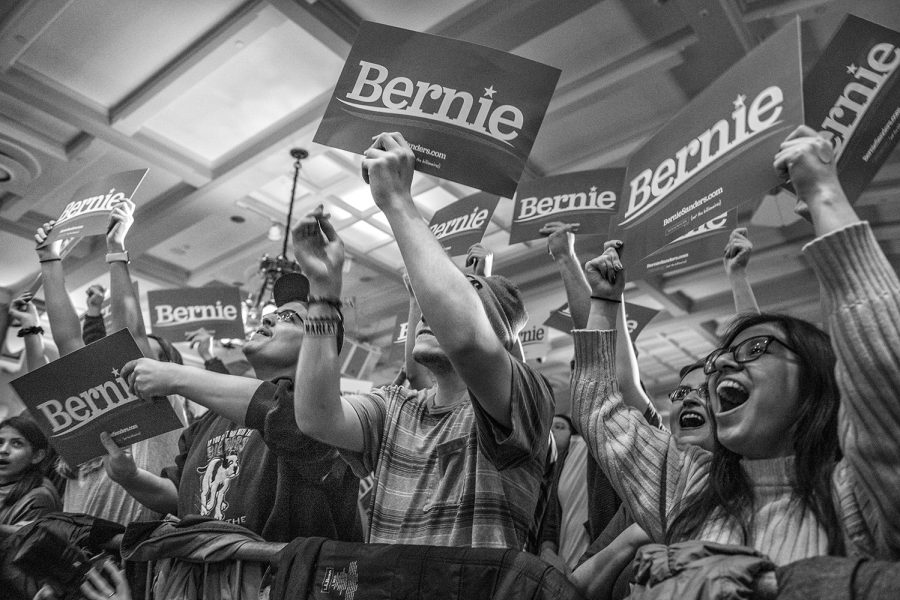Neal: Your Mind: Why you should speak it
As the political climate heats up nearing 2020, opinions are everywhere, and some people are increasingly hesitant to speak their minds. But opinions, especially politically charged ones, should not be a taboo.
Supporters cheer as Sen. Bernie Sanders, I-Vt., speaks during a campaign rally at the Iowa Memorial Union on Friday, March 8, 2019. The rally was a part of Sen. Sanders’ first trip to Iowa since announcing his 2020 presidential bid.
March 25, 2019
As a bona fide liberal snowflake and 22-year-old social-media-holic, it’s safe to say I’m not shy when it comes to voicing my opinion.
I mean, look at the section I write for.
Growing up I always spoke my mind — sometimes, one could argue, to a fault.
Then again, can one ever speak her or his mind too much? In other words, should suppressing one’s opinion be the societal norm?
I’m guessing a number of your brains automatically, and rather subconsciously said, “Yes.” Some opinions should just be kept to oneself. When I’m on the topic of reading your minds, I know what some of you also might be thinking: you’re thinking: Is this girl REALLY about to write an opinion column on … opinions?
Yep.
And let me tell you why.
It’s fair to say that not all opinions necessarily serve a dire purpose. Maybe you don’t need to tell your sister that shirt isn’t her color. Maybe you don’t need to tell your aspiring-rap-star-cousin that you just don’t think his million-dollar idea is going to happen.
RELATED: Neal: Political jargon: Why it’s important to be critical
But those aren’t the opinions I’m focusing on.
As a political-science student, I’ve often heard such topics as politics barred as taboo. One of those words on the list of things we should NEVER to discuss on a first date — something that only engenders argument and division. And for that reason, I, as well as those around me, are to keep our opinions to ourselves. We could offend somebody.
But this is the antithesis of what we should be doing (surprise, surprise, we liberals really aren’t all that snow-flakey after all).
As the 2020 election inches closer to becoming an imminent reality, opinions are literally everywhere.
Literally. Everywhere.
You can’t switch your television station, log onto your Twitter-feed, or even walk through your local grocery store without seeing or hearing something that suggests an explicit bias — and it just so happens, in today’s climate, most of said opinions are political.
Why does it matter? Why are people like me just out “looking for an argument”? (Ah, yes, one of my all-time favorite criticisms.)
I’m not looking for an argument — at least not in the word’s negative connotation. I was compelled to write this column because I reject the notion that every expressed opinion need be accompanied with combative intention or with a desire to “fight.”
I reject this notion not only because I believe it to be false but also because to understand others’ opinions, like, say, in the case of a presidential election (see what I’m getting at?), one simply needs to be attuned to the opinions of her or his own to be successful in gauging support.
As much as I like to think I know it all, I don’t (go ahead and insert your “liberals-are-know-it-alls” jokes here.)
I do, however, know at least one thing: Hearing others’ opinions, even the ones I desperately, unapologetically, unequivocally disagree with, still teach me something. They teach me an opposing viewpoint. They teach me tolerance. They teach me the importance of knowing where I stand on important, society-altering issues.
But most importantly, it teaches me that voicing your views doesn’t always have to be a taboo.






